Feb 27, 2016 | Focolare Worldwide
Pascal Bedros, a focolarino from Aleppo writes:“With the ceasefire, a calm night enveloped the whole city of Aleppo. Up to the last moment, no one expected it to go through. It’s a first step towards building dialogue and peace. We thank God and the people of good will for this gift. It was a nice gift for the children who slept a peaceful night in the arms of their parents. This weekend we’ll get together in Aleppo, following a long period in which it was impossible for us to come together and share our life in the spirituality of the Focolare which has kept us going in these long years and also illuminated our social effort.” The ceasefire in Syria, the first since the beginning of the conflict in 2011, negotiated by Russia and the United States, began at midnight of February 26th. United Nations special envoy, Staffan De Mistura, announced that peace talks could resume on March 7th if the ceasefire holds. Testimony of the Focolare community in Syria (May 2015) https://vimeo.com/127010352
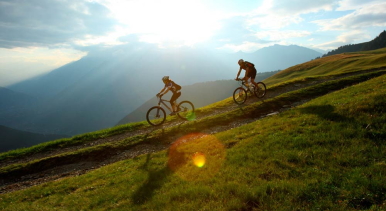
Feb 26, 2016 | Focolare Worldwide
 “I am a clerk and I live in Catanzaro. While participating in a meeting with friends who are committed to social work, I got to know that some young foreigners living in a centre for refugees, needed bicycles to go to work. I remembered that in my garage there were two mountain bikes, still in good condition. These bikes meant a lot to me, since they reminded me of the many long mountain excursions I had with my son. Without hesitating I raised my hand to offer them. But to have them brought to the destination, there some difficulties to overcome. Sometime later I found out that these friends had organised for the end of January, a three-day convention in a touristic village near the residence of the refugees, and in which I was invited to participate. You cannot imagine the joy I felt with this news. I myself could bring these bikes – at zero time frames and costs – and furthermore I could deliver them directly to the beneficiaries and have the chance to meet them. There was, however, another hindrance: the bikes were too bulky and I couldn’t fit them into the boot of my car. Not knowing what to do, I asked a neighbor who deals with used objects, if he had a solution. But when he found out that I wanted to give the bikes to refugees, he started saying that it was better to give them to him since he would earn something, and that he thought “it was not opportune to help these strangers who come to our country to grab from us the little job opportunities there are, and create many problems and social strife.” But on seeing that I kept my grounds on my decision, he said that the car of a common friend of ours had two bike racks, and which was exactly what I needed. When asked, this friend instead was very willing and glad to give me his bike rack. Things proceeded at best. On the set day, four young refugees came to the place of our seminar to retrieve the bikes. The minute they saw the bikes that were still mounted on the top of the car, I saw their eyes light up. They had perhaps thought of retrieving some old rusty bikes, and instead these were nice, new and in perfect working order. We were all happy. Then, shyly, but with great dignity they thanked us saying that they were poor and had nothing to give us in return, but that the same evening they would return to sing their songs with their drum, during the Eucharistic celebration. I am convinced that the friendship that was established will remain.” (Domenico, Italy)
“I am a clerk and I live in Catanzaro. While participating in a meeting with friends who are committed to social work, I got to know that some young foreigners living in a centre for refugees, needed bicycles to go to work. I remembered that in my garage there were two mountain bikes, still in good condition. These bikes meant a lot to me, since they reminded me of the many long mountain excursions I had with my son. Without hesitating I raised my hand to offer them. But to have them brought to the destination, there some difficulties to overcome. Sometime later I found out that these friends had organised for the end of January, a three-day convention in a touristic village near the residence of the refugees, and in which I was invited to participate. You cannot imagine the joy I felt with this news. I myself could bring these bikes – at zero time frames and costs – and furthermore I could deliver them directly to the beneficiaries and have the chance to meet them. There was, however, another hindrance: the bikes were too bulky and I couldn’t fit them into the boot of my car. Not knowing what to do, I asked a neighbor who deals with used objects, if he had a solution. But when he found out that I wanted to give the bikes to refugees, he started saying that it was better to give them to him since he would earn something, and that he thought “it was not opportune to help these strangers who come to our country to grab from us the little job opportunities there are, and create many problems and social strife.” But on seeing that I kept my grounds on my decision, he said that the car of a common friend of ours had two bike racks, and which was exactly what I needed. When asked, this friend instead was very willing and glad to give me his bike rack. Things proceeded at best. On the set day, four young refugees came to the place of our seminar to retrieve the bikes. The minute they saw the bikes that were still mounted on the top of the car, I saw their eyes light up. They had perhaps thought of retrieving some old rusty bikes, and instead these were nice, new and in perfect working order. We were all happy. Then, shyly, but with great dignity they thanked us saying that they were poor and had nothing to give us in return, but that the same evening they would return to sing their songs with their drum, during the Eucharistic celebration. I am convinced that the friendship that was established will remain.” (Domenico, Italy)
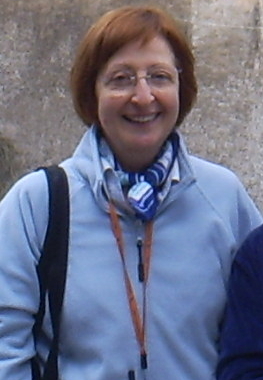
Feb 24, 2016 | Focolare Worldwide
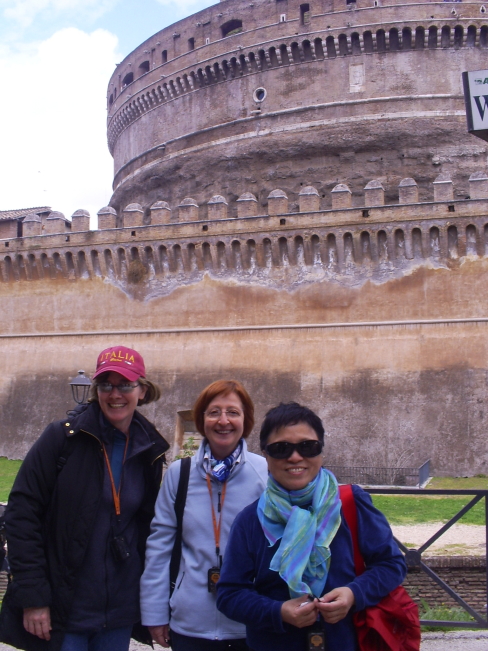
Maria Grazia Brusadelli (centre)
 At the moment, it is probably the most “extreme” periphery. Now Maria Grazia is preparing her documents for the move and visiting her relatives to inform them of her decision. She would still have time to change her mind, since the reports of new hostilities. A few days ago there was news of a bomb being detonated at a Doctors Without Borders hospital in Arat al Numan, leaving 8 dead and 40,000 people without medical care in an area of conflict. The killing of a young Caritas volunteer in Aleppo was also reported. Maria Grazia, what effect do these news reports have on you? Are you having any second thoughts? “Absolutely not. It’s true, each tragic news report is like an arrow to the heart. But I’m not afraid. Even though I’m well aware of the risks, I don’t fear for myself. I think of the people living there, and I already want to be with them to share their pain, to bring them – at least by being there, since I don’t speak Arabic – a little bit of hope. I’d like to already be there to make them feel the support and the nearness of Focolare members around the world who pray for them every day that peace will return to Syria. The Syrians with whom we are in contact are very grateful for this global participation and for all that’s being done on the ground to alleviate their hardship. I’d also like to already be there to bring them the love and hope of the Church. I’ll have the opportunity to meet with the Holy Father before going, and so I’ll be able to give them a message from him. In Damascus there are three women focolarini waiting for me, and the men focolarini in Aleppo. They live in close communion with the people in Syria who have embraced the spirituality of unity, and there’s the ecumenical and interreligious dialogue that’s very much alive among the locals. Because the Focolare – wherever it is in the world – has the spirit of a family, both among the members and with everyone else.”
At the moment, it is probably the most “extreme” periphery. Now Maria Grazia is preparing her documents for the move and visiting her relatives to inform them of her decision. She would still have time to change her mind, since the reports of new hostilities. A few days ago there was news of a bomb being detonated at a Doctors Without Borders hospital in Arat al Numan, leaving 8 dead and 40,000 people without medical care in an area of conflict. The killing of a young Caritas volunteer in Aleppo was also reported. Maria Grazia, what effect do these news reports have on you? Are you having any second thoughts? “Absolutely not. It’s true, each tragic news report is like an arrow to the heart. But I’m not afraid. Even though I’m well aware of the risks, I don’t fear for myself. I think of the people living there, and I already want to be with them to share their pain, to bring them – at least by being there, since I don’t speak Arabic – a little bit of hope. I’d like to already be there to make them feel the support and the nearness of Focolare members around the world who pray for them every day that peace will return to Syria. The Syrians with whom we are in contact are very grateful for this global participation and for all that’s being done on the ground to alleviate their hardship. I’d also like to already be there to bring them the love and hope of the Church. I’ll have the opportunity to meet with the Holy Father before going, and so I’ll be able to give them a message from him. In Damascus there are three women focolarini waiting for me, and the men focolarini in Aleppo. They live in close communion with the people in Syria who have embraced the spirituality of unity, and there’s the ecumenical and interreligious dialogue that’s very much alive among the locals. Because the Focolare – wherever it is in the world – has the spirit of a family, both among the members and with everyone else.”
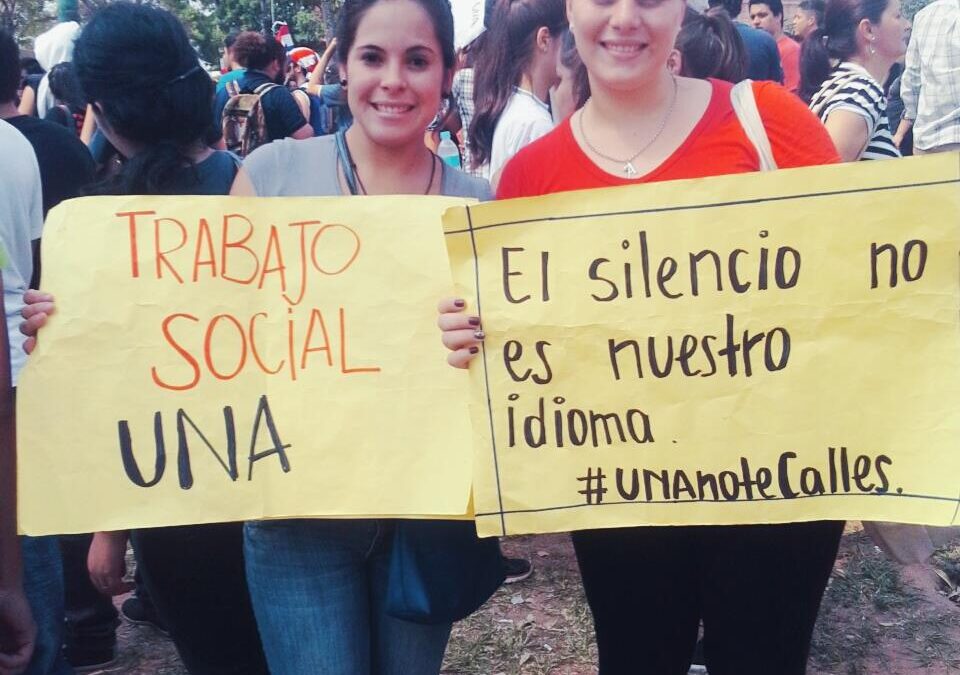
Feb 16, 2016 | Focolare Worldwide
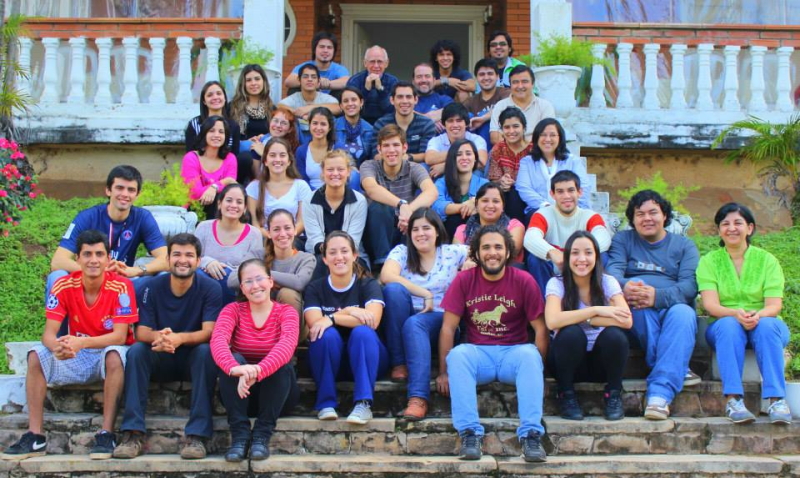 Thousands of university students have denounced the rampaging corruption in the country’s main state university, the Università Nazionale of Asunción (UNA). A long austere spring ended with chain resignations of the academic authorities, and negotiations on the reforms of a statute drafted during the dictatorship. The university youth surprised everyone with their seriousness and organisation. In the month in which the campus was occupied, they created a true and proper “alternative State.” There were watch shifts at the doors, inspection of bags and car boots to prevent the introduction of alcoholic beverages, efficient orders for food and essential services, and oganisation of a supplementary school calendar, with the help of professors and graduating students. And now the schedule of exams has been adjusted so that no one would lose the semester. They furthermore demonstrated intelligence in not allowing themselves to be exploited by anybody. Their reference point and model was Pope Francis who had met thousands of young people in his visit to Paraguay. His appeal to “raise a din and then organise it,” was fully heeded. Among the leaders of the pacific revolt was #UNAnotecalles (“UNA speak up”), the youth of the Focolare. Alejandra and Cecilia, Medicine and Engineering students, respectively, said: “It all started with a sit-in before the Rector’s building, to demonstrate our indignation with regard to the latest reports of corruption. Every day there was a peaceful demonstration during which the mike was passed around to the students, professors and officers. Then came a permanent wake around the building, with a strike of the students to demand the resignation of the Rector and his assistants. The support of the people who provided food and other forms of aid, gave us the strength not to give up our battle, and made us see that it was a struggle for everyone’s good. After 40 days the Rector resigned along with five officers and another 38 were indicted, followed by the resignation of all the faculty deans. What was fundamental for us was to live this phase with all the Gen studying in the UNA university, and also with the others who expressed their support in various ways. Certain of Jesus’s promise to be among us if we unite in His name, we did our best to make it a reality. He was our guiding light in defending the evangelical values of love, truth and justice, and overcoming the many difficult moments. At times it was not easy to control the crowd that seemed to be overwhelmed by emotions. In those instants, when the right thing to do was not clear, we tried to decide together how to act and what decision to make.
Thousands of university students have denounced the rampaging corruption in the country’s main state university, the Università Nazionale of Asunción (UNA). A long austere spring ended with chain resignations of the academic authorities, and negotiations on the reforms of a statute drafted during the dictatorship. The university youth surprised everyone with their seriousness and organisation. In the month in which the campus was occupied, they created a true and proper “alternative State.” There were watch shifts at the doors, inspection of bags and car boots to prevent the introduction of alcoholic beverages, efficient orders for food and essential services, and oganisation of a supplementary school calendar, with the help of professors and graduating students. And now the schedule of exams has been adjusted so that no one would lose the semester. They furthermore demonstrated intelligence in not allowing themselves to be exploited by anybody. Their reference point and model was Pope Francis who had met thousands of young people in his visit to Paraguay. His appeal to “raise a din and then organise it,” was fully heeded. Among the leaders of the pacific revolt was #UNAnotecalles (“UNA speak up”), the youth of the Focolare. Alejandra and Cecilia, Medicine and Engineering students, respectively, said: “It all started with a sit-in before the Rector’s building, to demonstrate our indignation with regard to the latest reports of corruption. Every day there was a peaceful demonstration during which the mike was passed around to the students, professors and officers. Then came a permanent wake around the building, with a strike of the students to demand the resignation of the Rector and his assistants. The support of the people who provided food and other forms of aid, gave us the strength not to give up our battle, and made us see that it was a struggle for everyone’s good. After 40 days the Rector resigned along with five officers and another 38 were indicted, followed by the resignation of all the faculty deans. What was fundamental for us was to live this phase with all the Gen studying in the UNA university, and also with the others who expressed their support in various ways. Certain of Jesus’s promise to be among us if we unite in His name, we did our best to make it a reality. He was our guiding light in defending the evangelical values of love, truth and justice, and overcoming the many difficult moments. At times it was not easy to control the crowd that seemed to be overwhelmed by emotions. In those instants, when the right thing to do was not clear, we tried to decide together how to act and what decision to make.
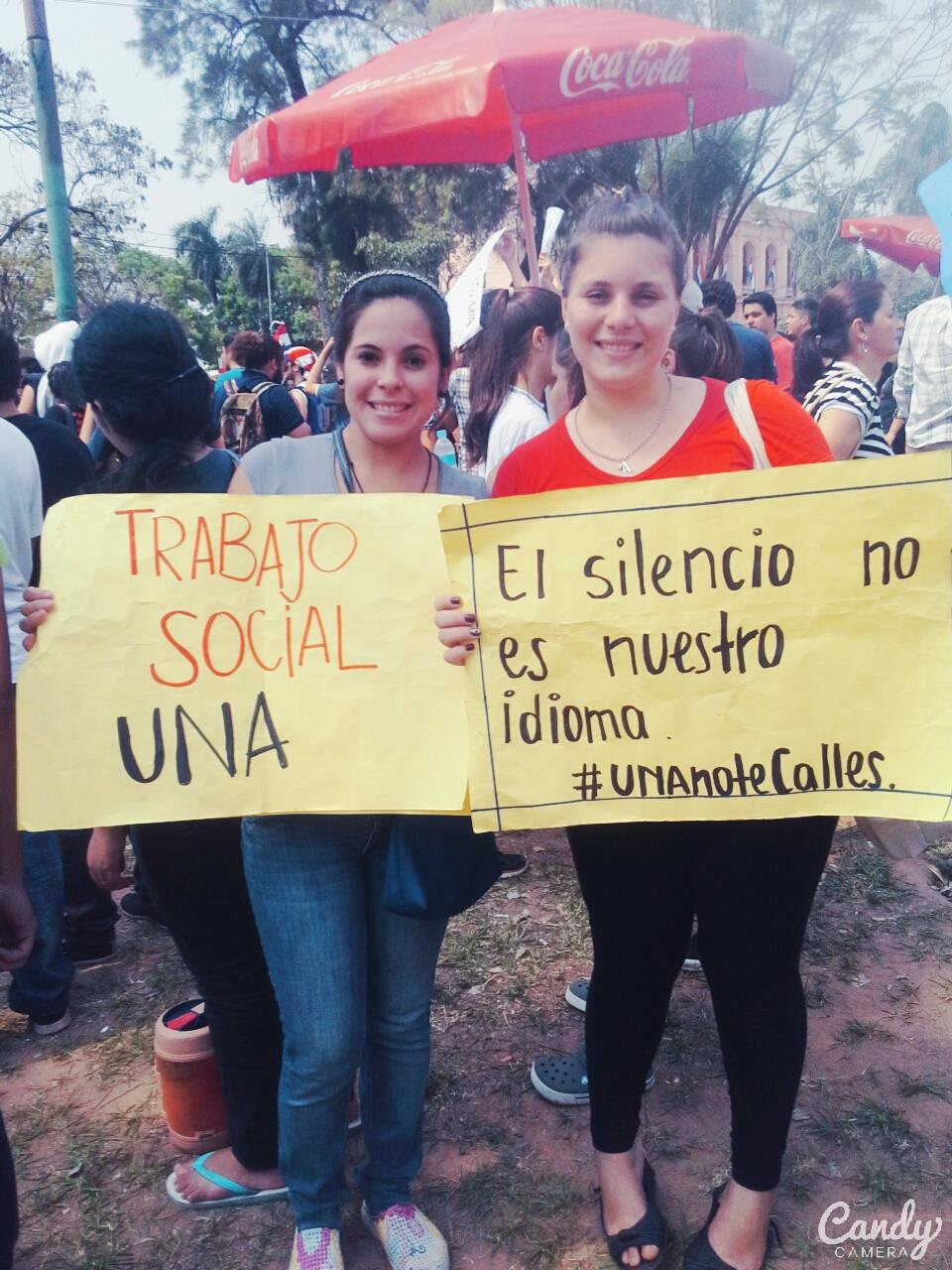
Leticia (left)
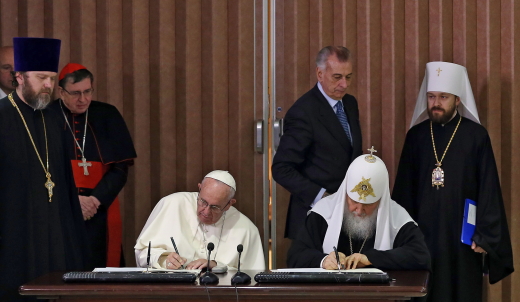
Feb 15, 2016 | Focolare Worldwide
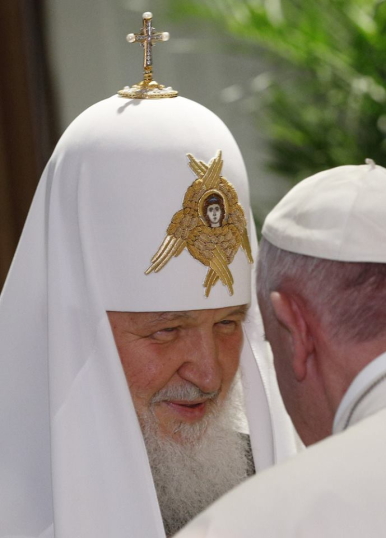 The Airport of Havana, Cuba, hosted the first meeting in history between the Bishop of Rome and the Patriarch of Moscow, on February 12, 2016. It was a fraternal encounter “between bishops’ that “gave an opportunity to listen and understand each other’s positions” said Patriarch Kirill at the conclusion of the meeting. Among the common concerns were the desire for peace and the defence of persecuted Christians around the world. “I felt the consolation of the Holy Spirit in this dialogue,” Pope Francis remarked, with the prospect of “a series of initiatives” to be carried forward together. “We are not competitors but brothers, and this concept must guide all our mutual actions as well as those directed to the outside world,” states the Joint Declaration that was signed by the Pope and the Patriarch. The declaration calls for common efforts between Roman Catholic and Orthodox Christians, and overcoming the historic divergences we have inherited, responding together to the challenges of today’s world. Christians are now victims of persecutions and violence in Syria, Iraq and other Middle East countries. Other challenges include the fight against terrorism, interreligious dialogue, European integration and respect for religious identities. The document also mentions social and ethical topics, with “pastoral” concern, as Pope Francis stressed while speaking with journalists on the flight between Cuba and Mexico: poverty, the breakdown of the family, the right to life (abortion, euthanasia and assisted reproduction), young people and peace in Ukraine. Much of the future of humanity will depend on our capacity to give shared witness to the Spirit of truth in these difficult times,” the document goes on to say.
The Airport of Havana, Cuba, hosted the first meeting in history between the Bishop of Rome and the Patriarch of Moscow, on February 12, 2016. It was a fraternal encounter “between bishops’ that “gave an opportunity to listen and understand each other’s positions” said Patriarch Kirill at the conclusion of the meeting. Among the common concerns were the desire for peace and the defence of persecuted Christians around the world. “I felt the consolation of the Holy Spirit in this dialogue,” Pope Francis remarked, with the prospect of “a series of initiatives” to be carried forward together. “We are not competitors but brothers, and this concept must guide all our mutual actions as well as those directed to the outside world,” states the Joint Declaration that was signed by the Pope and the Patriarch. The declaration calls for common efforts between Roman Catholic and Orthodox Christians, and overcoming the historic divergences we have inherited, responding together to the challenges of today’s world. Christians are now victims of persecutions and violence in Syria, Iraq and other Middle East countries. Other challenges include the fight against terrorism, interreligious dialogue, European integration and respect for religious identities. The document also mentions social and ethical topics, with “pastoral” concern, as Pope Francis stressed while speaking with journalists on the flight between Cuba and Mexico: poverty, the breakdown of the family, the right to life (abortion, euthanasia and assisted reproduction), young people and peace in Ukraine. Much of the future of humanity will depend on our capacity to give shared witness to the Spirit of truth in these difficult times,” the document goes on to say.  “Here in Moscow there is also the feeling that this was an important and historic meeting” writes focolarina Anna Gloria from the focolare in Moscow. The mass media are talking about it a lot. Bishop Paolo Pezzi invited everyone to the Cathedral of the Immaculate Conception to pray for unity. It was quite beautiful. There were Catholics and Orthodox from several movements and communities. Everyone feels that an important step towards unity has been taken.” Despite recent tensions between Moscow and Rome, the Russian Orthodox Church has a long history of seeking the reconciliation of the divided Christian churches. Father Hyacinthe Destivelle said so during an interview with the Vatican Radio. He is in charge of relations with the Slavic Orthodox Churches at the Pontifical Council for Christian Unity and was in Cuba for the meeting. Father Destivelle also explained that “the Russian Orthodox Church is fifth in the traditional order of authority among the 14 autocephalous Orthodox Churches. First position belongs to the Patriarchate of Constantinople, with a primacy of honour. It has a special relationship with the Holy See.” “The significance of the meeting between Pope Francis and Patriarch Kirill can also be seen in light of history with the Russian Orthodox Church,” where it “can act as a bridge between East and West.” Father Destivelle also gave other examples of how the Russian Orthodox Church was an active pioneer in ecumenical relations. It was the first Church to send observers during the Second Vatican Council. During their private meeting, Pope Francis and Patriarch Kirill also discussed the upcoming Pan-Orthodox Council scheduled for June 2016 in Crete. It will ”gather all the Orthodox churches for an Orthodox Synod,” Dr. Dimitrios Keramidas recently explained at an ecumenical school of the Focolare Movement, “this is not an event that is inserted into ecclesial life, but rather the official manifestation of the communional essence of the Church, the on-going and uninterrupted journey of the People of God.” It is a journey towards unity.
“Here in Moscow there is also the feeling that this was an important and historic meeting” writes focolarina Anna Gloria from the focolare in Moscow. The mass media are talking about it a lot. Bishop Paolo Pezzi invited everyone to the Cathedral of the Immaculate Conception to pray for unity. It was quite beautiful. There were Catholics and Orthodox from several movements and communities. Everyone feels that an important step towards unity has been taken.” Despite recent tensions between Moscow and Rome, the Russian Orthodox Church has a long history of seeking the reconciliation of the divided Christian churches. Father Hyacinthe Destivelle said so during an interview with the Vatican Radio. He is in charge of relations with the Slavic Orthodox Churches at the Pontifical Council for Christian Unity and was in Cuba for the meeting. Father Destivelle also explained that “the Russian Orthodox Church is fifth in the traditional order of authority among the 14 autocephalous Orthodox Churches. First position belongs to the Patriarchate of Constantinople, with a primacy of honour. It has a special relationship with the Holy See.” “The significance of the meeting between Pope Francis and Patriarch Kirill can also be seen in light of history with the Russian Orthodox Church,” where it “can act as a bridge between East and West.” Father Destivelle also gave other examples of how the Russian Orthodox Church was an active pioneer in ecumenical relations. It was the first Church to send observers during the Second Vatican Council. During their private meeting, Pope Francis and Patriarch Kirill also discussed the upcoming Pan-Orthodox Council scheduled for June 2016 in Crete. It will ”gather all the Orthodox churches for an Orthodox Synod,” Dr. Dimitrios Keramidas recently explained at an ecumenical school of the Focolare Movement, “this is not an event that is inserted into ecclesial life, but rather the official manifestation of the communional essence of the Church, the on-going and uninterrupted journey of the People of God.” It is a journey towards unity.
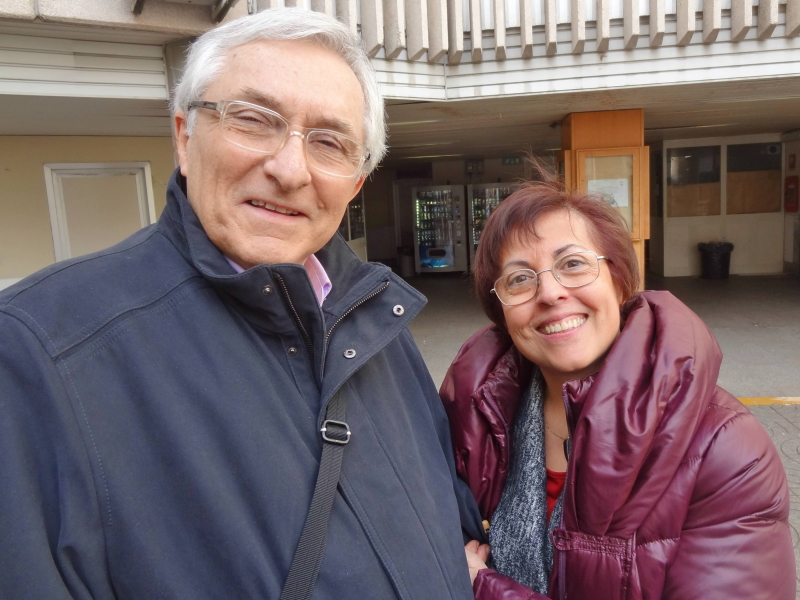
Feb 15, 2016 | Focolare Worldwide
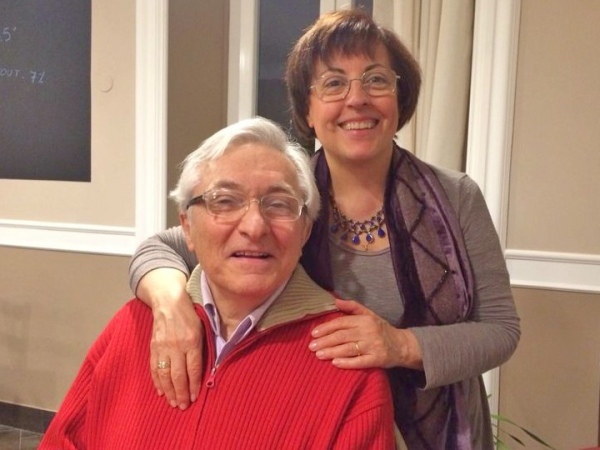 “When I left my home for the bank I was working at 21 years ago, I certainly wasn’t thinking that I wouldn’t return home that night. A strong headache forced my colleagues to take me to hospital. I was 49 years old with a well-established professional career, an upcoming promotion, a beautiful family with three daughters between 14 and 18. Suddenly and unexpectedly I found myself in a wheelchair that I was unable to control because, along with the use of my legs, I had also lost the use of my arms. I had been turned into nothing: I needed help eating, bathing and dressing. . . I was totally dependent on others. I was feeling desperate and anxious, feelings that I tried to reject because I knew they weren’t the solution. From when I embraced the spirituality of the Focolare, I have learned to be totally disposed to God’s will, and even though I didn’t understand the reason for this nightmare, my wife and I wanted to believe that it too was God’s love for me, for us. My daughters also shared in our decision and, right from the first days I found strength and patience that I never dreamed of finding. In a few months I regained the use of my legs and, with great effort and the support of a colleague who accompanied me was able to go back to work for another 7 years. Then I just couldn’t do it anymore.”
“When I left my home for the bank I was working at 21 years ago, I certainly wasn’t thinking that I wouldn’t return home that night. A strong headache forced my colleagues to take me to hospital. I was 49 years old with a well-established professional career, an upcoming promotion, a beautiful family with three daughters between 14 and 18. Suddenly and unexpectedly I found myself in a wheelchair that I was unable to control because, along with the use of my legs, I had also lost the use of my arms. I had been turned into nothing: I needed help eating, bathing and dressing. . . I was totally dependent on others. I was feeling desperate and anxious, feelings that I tried to reject because I knew they weren’t the solution. From when I embraced the spirituality of the Focolare, I have learned to be totally disposed to God’s will, and even though I didn’t understand the reason for this nightmare, my wife and I wanted to believe that it too was God’s love for me, for us. My daughters also shared in our decision and, right from the first days I found strength and patience that I never dreamed of finding. In a few months I regained the use of my legs and, with great effort and the support of a colleague who accompanied me was able to go back to work for another 7 years. Then I just couldn’t do it anymore.” 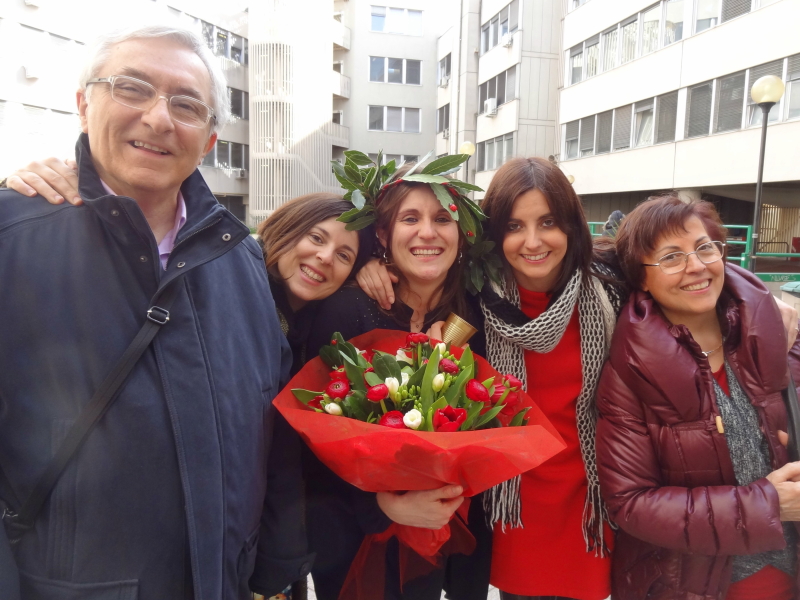 Already then, I wasn’t able to walk because of my handicap, if not just for short distances. I could no longer drive the car, take a shower alone, button my clothing, cut the food on my plate, turn on the coffee machine or embrace my wife and children. I couldn’t do any of those things that required the use of two hands. At times the fear was even bitterer. Fear of not being able go on living as a couple, fear of the solitude, of my fragility in the face of different situations, fear of the doubt about whether I would be able to continue in my role as father, and so on. Now, with much effort I continue with physiotherapy, even though I know that healing isn’t on the landscape. At least it slows the process of debilitation. During these 21 years God has never failed to accompany me with refined faithfulness, delicateness and tenderness that only He knows how to give. Pina and I have learned to let ourselves me carried by Him, to let ourselves be surprised by His Love. And when everything seemed to crumble, or became unstable, deep in our heart we understood that this partaking – in some way – in the mystery of Jesus on the Cross, was a privilege for us. Like Him, we try to overcome the pain by loving everyone around us, experiencing what could be called a ‘divine alchemy’ wherein suffering is like a talent to be turned into love.
Already then, I wasn’t able to walk because of my handicap, if not just for short distances. I could no longer drive the car, take a shower alone, button my clothing, cut the food on my plate, turn on the coffee machine or embrace my wife and children. I couldn’t do any of those things that required the use of two hands. At times the fear was even bitterer. Fear of not being able go on living as a couple, fear of the solitude, of my fragility in the face of different situations, fear of the doubt about whether I would be able to continue in my role as father, and so on. Now, with much effort I continue with physiotherapy, even though I know that healing isn’t on the landscape. At least it slows the process of debilitation. During these 21 years God has never failed to accompany me with refined faithfulness, delicateness and tenderness that only He knows how to give. Pina and I have learned to let ourselves me carried by Him, to let ourselves be surprised by His Love. And when everything seemed to crumble, or became unstable, deep in our heart we understood that this partaking – in some way – in the mystery of Jesus on the Cross, was a privilege for us. Like Him, we try to overcome the pain by loving everyone around us, experiencing what could be called a ‘divine alchemy’ wherein suffering is like a talent to be turned into love.  God took me/us by the hand and, little by little revealing his plan for us, led us into deep intimacy with Him among us, making us understand the mystery of suffering – in the light. And what could be considered a limit has been transformed into richness, what could have stopped us has been turned into a race. Not even an invasive handicap can take away the possibility of being a tool in God’s hands for our neighbor.” Giulio Ciarrocchi
God took me/us by the hand and, little by little revealing his plan for us, led us into deep intimacy with Him among us, making us understand the mystery of suffering – in the light. And what could be considered a limit has been transformed into richness, what could have stopped us has been turned into a race. Not even an invasive handicap can take away the possibility of being a tool in God’s hands for our neighbor.” Giulio Ciarrocchi











